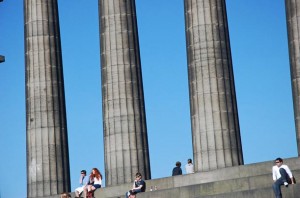In Great Time, intimacy simply is, offering knowingness.
This intimacy cannot be brought to our experience at will. It is a state of pure “allowingnessâ€. As if the meaning emerged without any barrier, free of judgments and preconceptions. The prevailing “logos†loosens between the chain of thoughts, giving rise to possibilities not imagined.
I am always inspired by the work of blind photographers I once saw in a documentary on television. It is “normal†or “usual†to think of all the limitations a blind person can have in his or her relationship to the world. But, instead of conducting forward into order, we she can improvise.
 The photographs of an Scottish artist are imbued with the freedom that comes from
The photographs of an Scottish artist are imbued with the freedom that comes from
not seeing. Rather, her inspiration is triggered by non-retinal criteria. “I’ll hold my camera at arm’s length, lay it on the ground, hold it overhead,” she says. “I can be experimental because I don’t see. Instead, I sense light on my face. I hear the rustle of the wind in the trees or smell the fragrance of the flowers in the air. People ask me how I compose my shots,” she laughs, “Well, I don’t.”
Ref. Â Â http://content.time.com/time/photogallery/0,29307,1897093_1883577,00.html
It is difficult for me to imagine myself blind, but knowing the experience of that photographer opens a gateway for a different kind of being.
We can draw on imperfection to activate knowledgeability. We can inhabit the inwardness of time, a nameless, creative arising, made available through the transformation of the experiencer into great silent light.
Time is available to be danced directly, without imposed order or founding narratives. In this directness, knowledge is available also, without obstacles or preconditions, without special effort or acquisition. DTS 154
